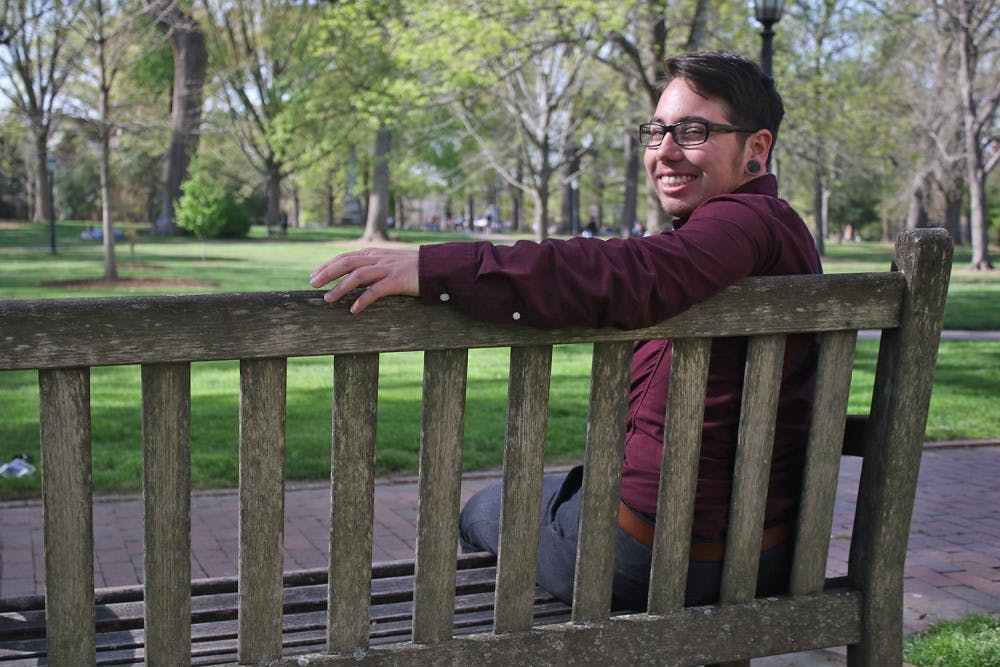A Mexican-American, Joaquín Carcaño works with UNC’s Institute for Global Health and Infectious Diseases connecting Mexican men and Mexican transgender women who are HIV positive with support services.
He left the Peace Corps in 2012, where he worked in community health and HIV resources in Peru. He relocated to North Carolina to join his brother, then a graduate student at UNC.
Shortly after arriving, Joaquín Carcaño accepted his position in Chapel Hill.
“HIV affects the marginalized already — so people of color, the LGBT community, and I think I’ve always been drawn to that,” he said.
Joaquín Carcaño met one client at UNC who was born a man who identifies as a woman and who was unaware of the term “transgender” altogether.
“It was this incredible moment for her to be brought into this community,” he said. “She was so excited to find that she was not alone.”
Sofia Rivera Peña, Joaquín Carcaño’s partner, said Joaquín Carcaño is introverted and doesn’t usually enjoy being the center of attention, which made his involvement in the case unexpected.
But she also said he is a fighter.
“He loves his family, and he believes that the work that you do in this world should be as helpful as possible,” Peña said.
Applying to medical school, Joaquín Carcaño hopes to serve marginalized communities — such as the LGBT and HIV positive communities — as a medical provider.
He said life in North Carolina includes hikes with his dog and spending time with Peña via FaceTime, as she still lives in his hometown near the U.S.-Mexico border.
But not every aspect of life in North Carolina has been harmonious. He said particularly in rural areas, it can be difficult when he is not perceived as a typical white American.
To get the day's news and headlines in your inbox each morning, sign up for our email newsletters.
“We can go into a place that feels friendly — that even can state they’re friendly — but you don’t know the people taking up the spaces in there,” he said. “And so I think that no matter what, you carry fear with you.”
He said the lack of discrimination protection in House Bill 2 puts his job in jeopardy, but he is fortunate to have the support of his boss and co-workers in his division at UNC.
“Many others that work at UNC are affected by this and could be in this place, but they don’t have the safety that I do,” Joaquín Carcaño said.
While there is vocal support for his case against the law, he said the University’s response is lacking.
“I think it is sort of, ‘We’re evaluating processes; we are evaluating what this means.’ But I think institutionally it is very separated from what is happening to the people that make up the University,” he said.
Diana Carcaño said Joaquín is aware of potential consequences of his involvement in the case.
“Joaquín has always been that individual who is not afraid to go out on a limb for things that he believes in — things that he is passionate about,” she said.
The fate of the lawsuit is now partially in the General Assembly’s hands, Joaquín Carcaño said.
“It really depends on what happens when they are back in session on April 25,” he said. “It’s up to (the assembly) to do the right thing — to fix their mistakes even though they have done so much damage already.”
But as the case moves forward, Joaquín Carcaño said he is not representative of the entire LGBT community — despite his elevated status.
“I am in a position where I have a platform, but I am one voice, and there is such a huge community,” he said. “They’re mobilizing, they’re vocal, they’re powerful — they’re angry for a very good reason.”
state@dailytarheel.com




